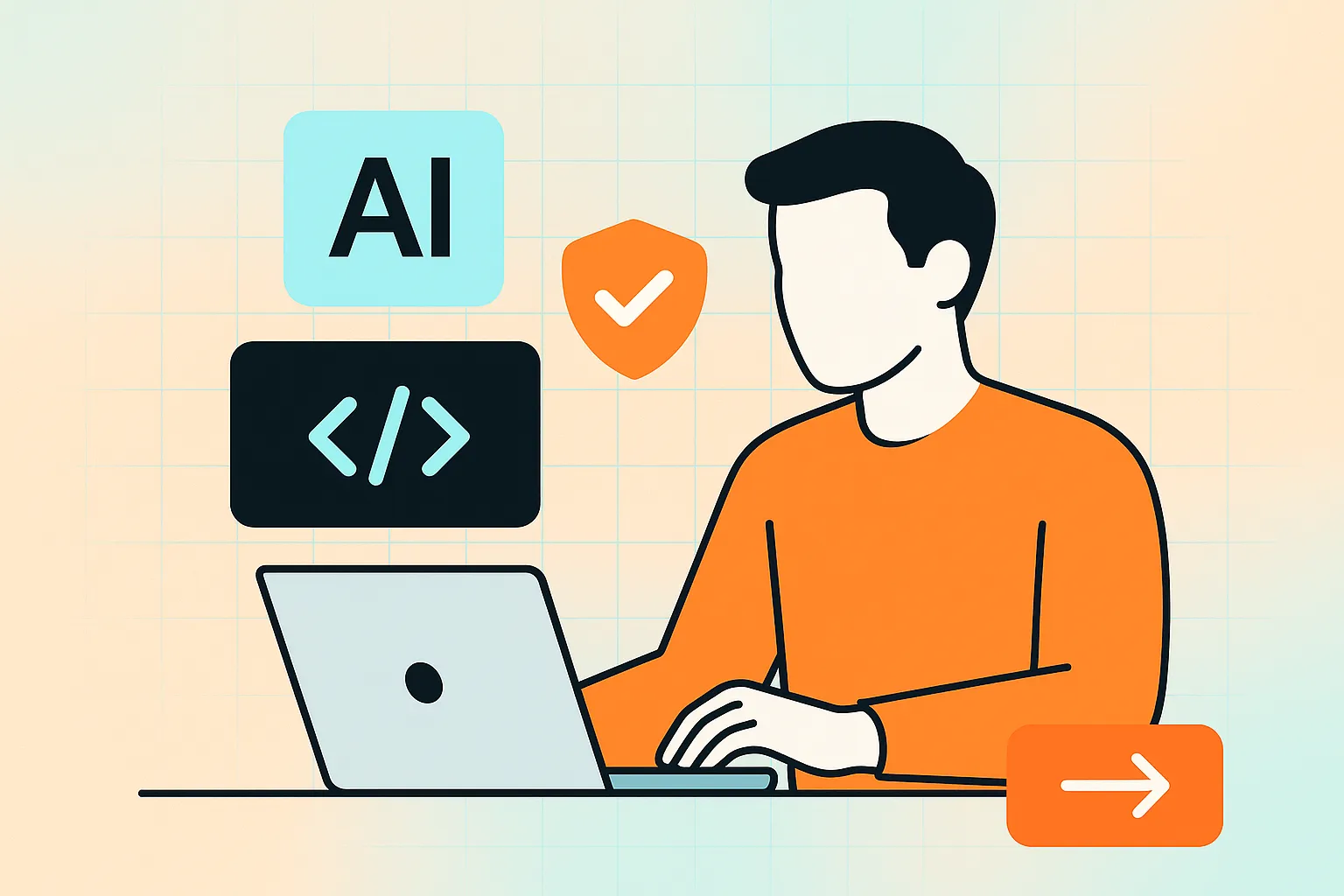The Double-Edged Sword of AI in Software Development
The software development landscape is undergoing a seismic shift, driven by the rapid proliferation of artificial intelligence. AI-powered coding assistants and other development tools are no longer a novelty; they have become integral to the modern software development lifecycle (SDLC). The promise is immense: accelerated timelines, enhanced productivity, and the ability to tackle complex problems with unprecedented efficiency. Our own 2025 AI-Enablement Benchmark Report shows that development and coding have the highest AI adoption rate across the SDLC, with 84% of teams integrating these tools into their workflows.
This rush to adopt AI, however, brings a host of new and complex security challenges. While developers are focused on shipping features faster, the very tools they rely on can introduce subtle vulnerabilities, expose proprietary code, and create new attack vectors for malicious actors. The same AI that suggests a clever algorithm might also propose a code snippet with a decade-old, well-known vulnerability. The convenience of generating boilerplate code comes with the risk of leaking sensitive intellectual property to third-party model providers.
Navigating this new terrain requires more than just awareness; it demands a strategic, security-first mindset. In this article, we will explore the critical security implications of using AI tools in software development. We will dissect the primary risks, from insecure code generation to data privacy breaches, and provide a framework for mitigating them. More importantly, we will discuss why partnering with a seasoned AI development agency is the most effective way to harness the power of AI without compromising your application’s security or your company’s integrity.
The Primary Security Risks of AI Development Tools
While the productivity gains from AI coding assistants are well-documented, the security risks are often less understood and far more insidious. These risks are not theoretical; they are practical challenges that engineering teams are facing today. A failure to address them proactively can lead to data breaches, reputational damage, and costly remediation efforts down the line.
Insecure and Vulnerable Code Suggestions
The most immediate risk posed by AI coding assistants is their potential to generate insecure code. Large language models (LLMs) are trained on massive datasets, including billions of lines of code from public repositories like GitHub. Unfortunately, this public code is a mixed bag, containing everything from elegant, secure algorithms to deprecated, vulnerable, and poorly written snippets.
The AI model has no inherent understanding of security best practices. It operates on patterns. If it has seen a particular vulnerability—like a SQL injection flaw or a cross-site scripting (XSS) vulnerability—repeatedly in its training data, it is likely to reproduce that pattern in its suggestions. A developer, especially one under pressure to meet a deadline, might accept this code without a thorough security review, inadvertently planting a security flaw directly into the codebase.
Consider these common scenarios:
- SQL Injection: An AI assistant might generate database query code that directly concatenates user input into a SQL string, a classic vector for SQL injection attacks.
- Insecure Defaults: The tool could suggest using outdated cryptographic algorithms or generate code that disables certificate validation for “convenience” during testing, which then accidentally makes its way into production.
- Improper Error Handling: AI-generated code may fail to handle errors gracefully, potentially leaking sensitive system information to an attacker when an exception occurs.
The core issue is context. The AI doesn’t understand the full security posture of your application, your data sensitivity requirements, or your organization’s compliance obligations. It simply provides the most statistically probable code completion, which is often not the most secure one.
Data Leakage and Intellectual Property Exposure
When a developer uses a cloud-based AI coding assistant, the code snippets, comments, and surrounding context from their IDE are often sent to a third-party server for processing. This creates a significant risk of data leakage.
Many standard terms of service for these tools grant the provider the right to use submitted data to train and improve their models. This means your proprietary algorithms, trade secrets, and internal business logic could become part of the AI’s training set. In a worst-case scenario, fragments of your code could be suggested to a developer at another company—perhaps even a direct competitor.
Furthermore, developers often embed sensitive information directly into their code during development, such as:
- API keys and authentication tokens
- Database credentials
- Personally Identifiable Information (PII) for testing
- Proprietary configuration details
If this code is sent to an external AI service, that sensitive data leaves your controlled environment. This not only exposes your intellectual property but can also create a serious compliance breach under regulations like GDPR, CCPA, and HIPAA, which have strict rules about data residency and the handling of personal information.
Over-reliance, Skill Degradation, and False Confidence
The human factor is a critical component of AI security risk. As developers become more accustomed to the convenience of AI-generated code, there is a tangible risk of skill atrophy. The critical thinking and deep understanding required to write secure code from first principles can diminish when a developer’s primary role shifts from writing to simply reviewing and stitching together AI suggestions.
This creates a dangerous cycle:
- A developer relies on an AI tool to generate code.
- The AI suggests a snippet with a subtle vulnerability.
- The developer, lacking recent practice in that specific area, approves the code without spotting the flaw.
- The application’s security is weakened, and the developer’s skills are not sharpened.
This over-reliance can foster a false sense of security. Teams may believe they are moving faster and writing better code, when in reality they are accumulating a hidden “security debt” that will eventually come due. The AI becomes a black box, and the team loses the ability to reason about the security implications of the code they are shipping.
Supply Chain Vulnerabilities
Modern applications are built on a complex foundation of open-source libraries and dependencies. AI coding assistants often suggest installing and using these packages to solve specific problems. However, the AI has no way of vetting the security or maintenance status of these dependencies.
It might recommend a package that has a known critical vulnerability, is no longer maintained by its author, or has even been compromised in a supply chain attack. A developer, trusting the AI’s suggestion, might npm install or pip install a malicious package without performing the necessary due diligence. This instantly compromises the security of the entire application and introduces a threat deep within the software supply chain.
How MetaCTO Builds Secure AI-Powered Applications
The security challenges introduced by AI are formidable, but they are not insurmountable. The key is to move from an ad-hoc, reactive approach to a strategic, intentional one. This is where partnering with a specialized AI development agency like MetaCTO provides a decisive advantage. We don’t just use AI tools; we build secure development frameworks around them. As an agency with over 20 years of experience launching more than 100 apps, we integrate security into every phase of the AI development lifecycle.
A Foundation of Expertise and Governance
First and foremost, we bring deep, specialized expertise to the table. Our teams of AI experts contribute extensive experience and sophisticated insights, ensuring that the AI solutions we build are not only cutting-edge but also secure and robust. Artificial intelligence consulting and development services are crucial for providing guidance through the complexities of AI implementation, and our approach is always grounded in security.
We help organizations establish clear governance policies for AI tool usage. Before a single line of AI-generated code is considered, we work with you to define:
- Approved Tools: A vetted list of enterprise-grade AI tools with strong security and privacy guarantees.
- Data Handling Protocols: Strict rules on what types of code and data can be submitted to third-party services.
- Review Mandates: A formal process requiring that all AI-generated code undergoes the same rigorous security code review as human-written code.
This structured approach is a core tenet of our AI-Enabled Engineering Maturity Index, a framework we use to help teams advance from reactive, high-risk AI usage to a strategic, AI-first posture where security is fully integrated.
Ensuring Regulatory Compliance and Data Privacy
Navigating the complex web of data privacy regulations is one of the most critical challenges in AI development. Our consulting services are designed to ensure your AI systems are compliant from the ground up.
- GDPR: We guide organizations through the complexities of GDPR regulations, guaranteeing the appropriate management of personal information and ensuring data processing activities are lawful and transparent.
- CCPA/CPRA: We craft bespoke strategies that align with CCPA and CPRA compliance demands, confirming that your company maintains conformity with California’s stringent data privacy legislation.
- HIPAA: For healthcare applications, our consultants offer their expertise to aid in meeting HIPAA benchmarks for patient data protection, ensuring that any AI processing of protected health information (PHI) is secure and compliant.
By collaborating with a seasoned firm like ours, you ensure that your sensitive and proprietary information is managed in strict accordance with all pertinent regulations, mitigating the risk of costly fines and reputational damage.
From Code Chaos to Secure Foundation
Many companies come to us after early, ungoverned AI experiments have left their codebase in a precarious state. This is precisely why we offer our Vibe Code Rescue service. We specialize in taking codebases that are tangled with inconsistent, potentially insecure AI-generated code and transforming them into a solid, secure, and scalable foundation for future growth. Our process involves a deep audit to identify vulnerabilities, refactoring insecure patterns, and implementing the governance needed to prevent future issues.
Continuous Monitoring, Support, and Training
Security is not a one-time checklist; it’s an ongoing process. We provide continuous optimization and support to maintain the effectiveness and security of the AI solutions we build. This includes:
- Vigilant Monitoring: We continuously monitor AI models and the applications they power for emerging threats and vulnerabilities.
- Model Refinement: External AI firms continually refine their models, and we ensure our clients have access to the latest, most secure technology.
- Team Enablement: We provide continuous training that equips your teams with the necessary knowledge and skills for using AI securely. Our tailored training initiatives strengthen your team’s ability to spot insecure AI suggestions and manage AI systems proficiently.
This commitment to persistent support and upkeep is crucial for maximizing system efficacy and security as technology and threat landscapes evolve.
Conclusion: Building a Secure Future with AI
Artificial intelligence is fundamentally reshaping software development, offering incredible opportunities for innovation and efficiency. However, this power comes with a profound responsibility to manage the associated security risks. Simply providing developers with AI coding assistants without a comprehensive security strategy is an invitation for disaster. Insecure code, data leaks, skill degradation, and supply chain vulnerabilities are not edge cases; they are predictable outcomes of ungoverned AI adoption.
A successful and secure AI implementation requires a multi-faceted approach. It begins with establishing strong governance and clear policies for tool usage. It demands rigorous security reviews for all code, regardless of its origin. It necessitates continuous training to ensure developers treat AI as a powerful assistant, not an infallible oracle. Most importantly, it requires deep expertise in both AI and application security to navigate the complex interplay between them.
This is the value of partnering with an experienced AI development firm. At MetaCTO, we provide the strategic guidance, technical expertise, and operational rigor needed to unlock the full potential of AI while safeguarding your most valuable assets. We help you move beyond reactive experimentation to build a secure, compliant, and highly productive AI-enabled engineering culture.
If you’re ready to leverage the power of AI to accelerate your development and drive transformative growth without compromising on security, the next step is to speak with an expert.
Talk with an AI app development expert at MetaCTO to build your secure AI strategy today.

